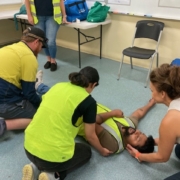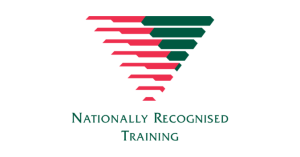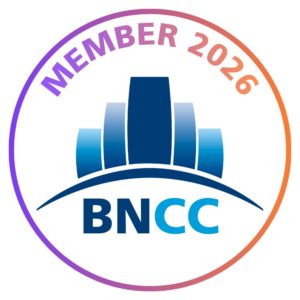Shock! What is it?
Managing a Casualty in Shock Following Injury
Shock, is a life-threatening condition that occurs when the body is not getting enough blood flow, depriving vital organs of oxygen. It often results from trauma, significant blood loss, burns, severe infections, or allergic reactions. Recognizing and treating shock rapidly can mean the difference between life and death. When a casualty develops shock after an injury, prompt and effective intervention is essential. This guide provides a thorough approach to recognizing, treating, and supporting a casualty who is experiencing shock.
What is Shock?
Shock is a critical failure of the circulatory system, leading to inadequate delivery of oxygen and nutrients to the tissues. It is not simply a psychological response or emotional upset—it is a physical crisis that requires immediate action. There are several types of shock, including hypovolemic (due to blood loss), cardiogenic (due to heart problems), septic (due to severe infection), and anaphylactic (due to severe allergic reaction). Injuries most commonly cause hypovolemic (from blood loss or fluid loss) and sometimes neurogenic shock (from spinal injury).
Recognizing Shock
Early recognition is crucial. The sooner treatment begins, the better the chance of survival. Look for these key signs and symptoms:
- Pale, cold, and clammy skin
- Rapid, weak pulse
- Rapid, shallow breathing
- Nausea or vomiting
- Thirst
- Confusion, anxiety, or restlessness
- Dizziness or faintness
- Low blood pressure (if able to measure)
- Blue tinge around lips and fingernails (cyanosis)
As shock progresses, the casualty may become unconscious. If shock is not treated, it can lead to organ failure and death.
Principles of Treating Shock
When you suspect someone is in shock, your priorities are:
- Call for emergency medical help immediately.
- Stop any ongoing loss of blood or fluids.
- Ensure an open airway and support breathing. Recovery position if unconscious and breathing normally.
- Help maintain body temperature by using an emergency blanket from the first aid kit if available.
- Reassure and monitor the casualty.
Step-by-Step Treatment
1. Call for Emergency Help
Time is of the essence. As soon as you suspect shock, dial emergency services. Give them clear information about the casualty’s condition, location, and details of the injury.
2. Lay the Casualty Down
Help the casualty to lie flat on their back fi conscious and make comfortable.
3. Control Bleeding and Treat Injuries
If the casualty is bleeding:
- Apply firm, direct pressure to the wound with a clean cloth, bandage, or even your hand if necessary.
- Do not remove any embedded objects—apply pressure around them.
4. Support Breathing and Airway
Make sure the airway is open:
- If they are unconscious but breathing, place them in the recovery position: on their side, with the mouth open and facing downward to allow fluids to drain.
- If necessary, clear the mouth of any obstructions.
5. Maintain Body Temperature
People in shock are very vulnerable to cold. Cover them with a blanket, coat, or any available covering to keep them warm, but avoid overheating. If outside, protect them from wind, rain, or snow. However, do not allow them to eat or drink, especially if surgery may be needed.
6. Monitor and Reassure
Stay with the casualty and observe their condition closely. Talk to them calmly and reassuringly, even if they seem confused or agitated. Be ready to perform CPR if they stop breathing and become unconscious.
7. Do Not Give Food or Drink
Do not give the casualty anything to eat or drink—even if they are thirsty. Food and fluids can complicate medical treatment, especially if surgery is required. If the casualty asks for water, moisten their lips with a damp cloth.
8. Loosen Tight Clothing
If safe and appropriate, loosen tight clothing to improve circulation and comfort.
9. Avoid Unnecessary Movement
Keep the casualty as still as possible. Excessive movement can worsen injuries or increase blood loss.
10. Keep Calm and Wait for Help
Remain calm to help the casualty to remain calm and provide reassurance. Calmly encourage the casualty to relax and breathe slowly. Stay alert for any changes in their condition.
Special Considerations
Spinal Injuries:
If you suspect a spinal injury, do not move the casualty’s head, neck, or back unless absolutely necessary for safety or to maintain an airway if unconscious and breathing. Do not elevate the legs. Call for professional help immediately.
Pregnancy:
For a pregnant casualty, avoid the shock position. Instead, place them on their left side to minimize pressure on major blood vessels.
What Not To Do
- Do not let the casualty get up or walk around.
- Do not give medication unless prescribed by a healthcare professional.
- Do not try to warm with a hot-water bottle or direct heat.
- Do not ignore any signs of worsening condition.
When to Perform CPR
If at any point the casualty becomes unconscious and stops breathing, begin CPR immediately and continue until help arrives. Attach a Defibrillator if available and follow the voice prompts.
Preventing Shock
While not always possible to prevent, quick recognition and treatment of injury, bleeding, or other causes can minimise the risk of shock developing. Educate yourself and others in basic first aid to be prepared for emergencies. It is always recommended to attend a First Aid Course under instruction of trained professionals to practice vital first aid skills.
Conclusion
Treating shock in an injured casualty is about rapid assessment, reassurance, and careful action. Your ability to stay calm, control bleeding, and keep the casualty warm can save a life. Remember, always seek professional medical help as soon as possible. First aid is not a substitute for proper medical care but is often the vital first step toward recovery.
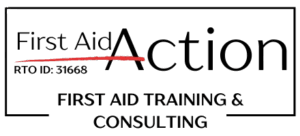
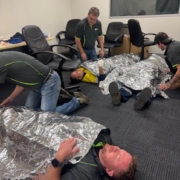



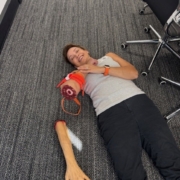
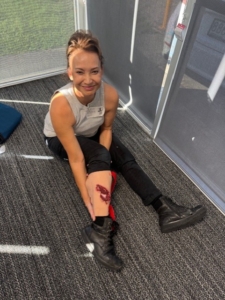
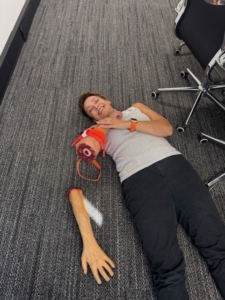
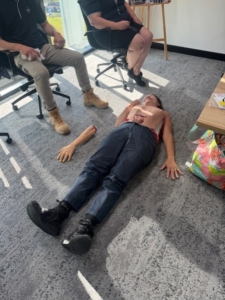
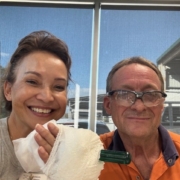
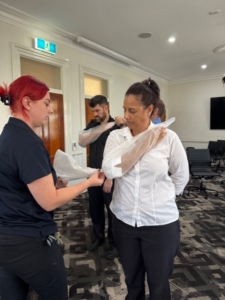
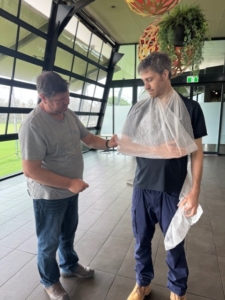
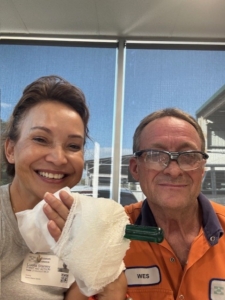
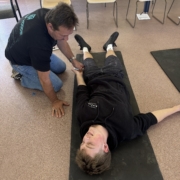
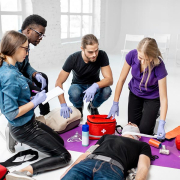
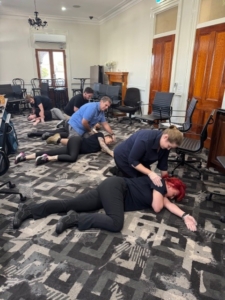
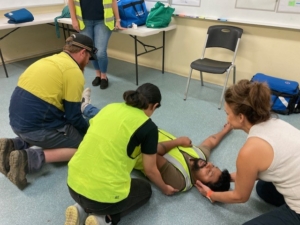
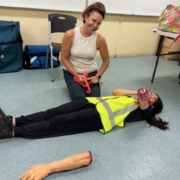
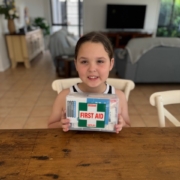
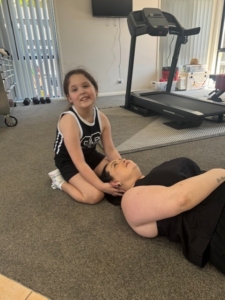 Here is 8 yr old Alexis helping her mum keep still after falling down the stairs at home.
Here is 8 yr old Alexis helping her mum keep still after falling down the stairs at home.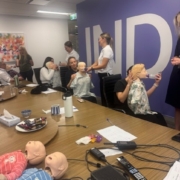
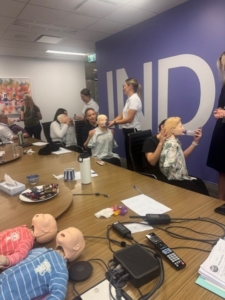 Staff from Dexus (Indooroopilly Shopping Centre Management) learning how to assist with an Asthma Attack.
Staff from Dexus (Indooroopilly Shopping Centre Management) learning how to assist with an Asthma Attack.